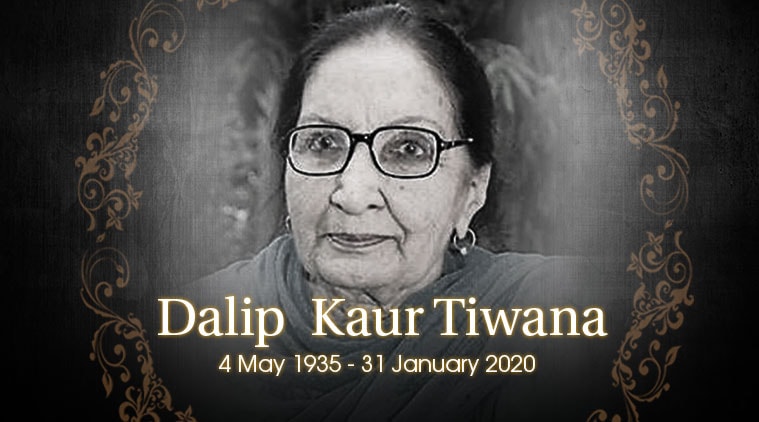 Dalip Kaur Tiwana passes away. (Image designed by Rajan Sharma)
Dalip Kaur Tiwana passes away. (Image designed by Rajan Sharma)
In October 2015 Dalip Kaur Tiwana, the leading novelist and short story writer in contemporary Punjabi literature, announced that she was returning her Padma Shri, the fourth highest civilian award. Tiwana was the first to give up the Padma Award, expressing “Solidarity with other writers who are protesting against the increasing cultural intolerance in our society and politics and the threat to free speech and creative freedom.” Tiwana had received the Padma Shri in 2004 for Literature and Education, as well as the Sahitya Akademi Award and had said, “I had something big to give up, for a cause I believe in and which is close to my heart, and this is my way of protest. Minorities are being crushed, and writers and rationalists are being murdered, and no one is allowed to speak,” she has spoken freely.
The writer, known for her grit and courage, passed away today at a private hospital in Mohali at 4 pm, where she was admitted since January 15 and was suffering from lung infection and respiratory problems. She was 84 and is survived by a son, grandson and her husband. Born in Rabbon, District Ludhiana in 1935, Tiwana did her Master’s degree in Punjabi literature and completed her doctorate from Panjab University in Punjabi. She retired as a Professor of Punjabi from Punjabi University, Patiala, and was residing at Punjabi University campus in Patiala with her family.
Tiwana, who was the first woman lecturer at Punjabi University and a writer-in-residence here, was given the Sahitya Akademi Award in 1971 for her novel ‘Eho Hamara Jivana’ (This is Our Life), making her one of the youngest authors to get the prestigious award. She was also honoured with the Shiromani Sahitkar Award by the state’s languages department in 1987. The characters in Tiwana’s novels and short stories are the downtrodden, rural people with suppressed desires and the complex inner conflict of the female psyche is the main subject of her works. Some of her distinguished literary works include ‘Peele Patteyan Di Daasta, Nangey Pairan Da Safar, Duni Suhava Bagh, Katha Kuknus Di, Lambi Udaari, Doosri Sita, Oh Taan Pari Si, Moh Maaya…’
Punjabi poet Gurbhajan Singh Gill, who succeeded Tiwani as the President of Sahitya Academy, Ludhiana in 2010, termed her death as an irreparable loss. “She was an extraordinary writer who could relate every character of her novel with the common people. She could easily tell her story to the masses, she was the among the few writers who continued to serve Punjabi language till her last breath and was one writer who wrote extensively on the man-woman relationship and described the many trials and tribulations a woman has to face,” added Dr. Gill.
Author and translator Rana Nayar describes Tiwana as one of the leading novelists in Punjabi, the only one to be decorated with Saraswati Sanmaan. “She wrote about the dilemmas, conflicts and pain of women caught in the jaws of a feudal society. Her women characters are not doubly but triply oppressed, as women, as women in a macho Punjabi society and as women in a feudal Punjabi culture. She spoke of a woman’s agony and anguish with a sense of inwardness, as only she could. Her women characters are as lonely as perhaps she herself was. But despite all this, she was a very positive and a cheerful person, always laughing, always bubbling with energy, even at 80. I remember having been a member of a jury of which she was the Chair, for a very prestigious prize. It was a treat to see the way she functioned, with total impartiality and integrity. Though she has left a rich body of work behind, my contention is that if she hadn’t written anything apart from ‘Kaho Katha Urvashi’, she would still have, as she now has, ensured herself a permanent place among the best, not only in Punjabi, but in the broader domain of Indian literature. I would like to remember her as a very sensitive and a graceful person, who could often disarm you with her personal gestures,” remembers Nayar.
Theatre director Sahib Singh says that Tiwana’s powerful works are a mirror to a common man’s life and what makes her a literary giant is the fact that each of work is layered. “I made a four-episode serial on her novel, ‘Teeli Da Nishan’. She was a down-to-earth human being, who always made a point to remain accessible to the people, and supported and encouraged young talent,” reflects Singh.
“She was my PhD guide and working with her was such an enriching experience. Her house number was B13 on the University campus, a number which is considered very inauspicious, but she received all her life honours while living in that house including the Padma Shri. She was very well connected with her students and treated them like family. She was encouraging and her students could approach her at any time of the day. Her work was a perfect blend of modernity and tradition, just like her,” shares Dr. Gurnyaib Singh, a former student of Tiwana.
Author Uma Trilok remembers Tiwana as a very loving person, who treated her like a daughter. “A noble soul, a committed teacher, an acclaimed and awarded writer, she has left behind huge void in the lives of people with whom she interacted. As a human being, she encouraged and helped younger and lesser known writers. She also graciously wrote the foreword of my book Amrita Imroz a Love Story,” shares Trilok.
Former Deputy Speaker of Punjab Assembly, Bir Davinder Singh who regularly visited Tiwana at the hospital termed her passing away as a the ‘greatest loss’ to the Punjabi literary world.